-
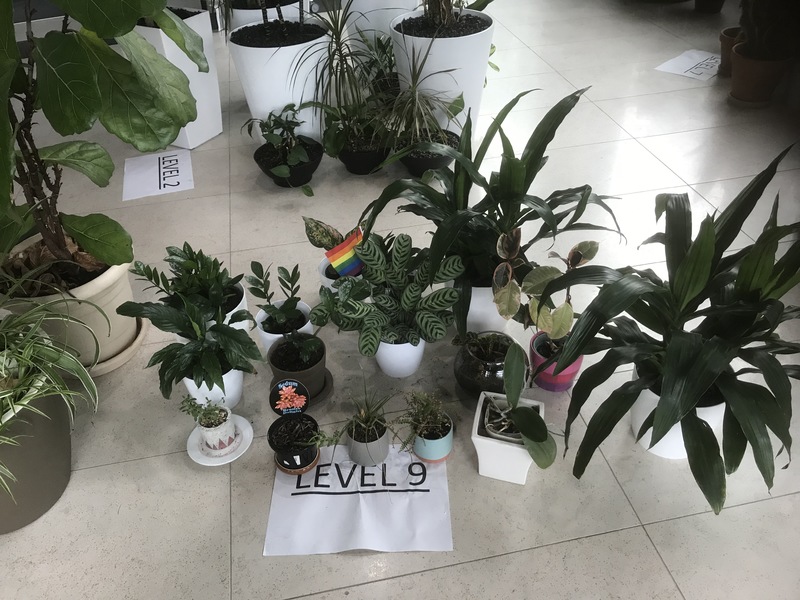
2020-04-17
Staff have vacated offices in the Law School at the University of Melbourne but pot plants from all floors are being looked after in the lobby
-
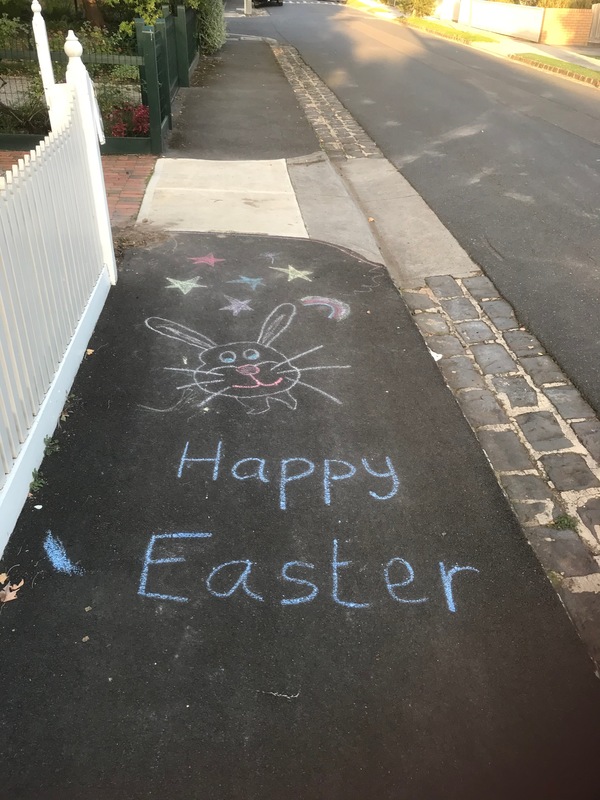
2020-04-17
Easter chalk message on neighbourhood footpath
-
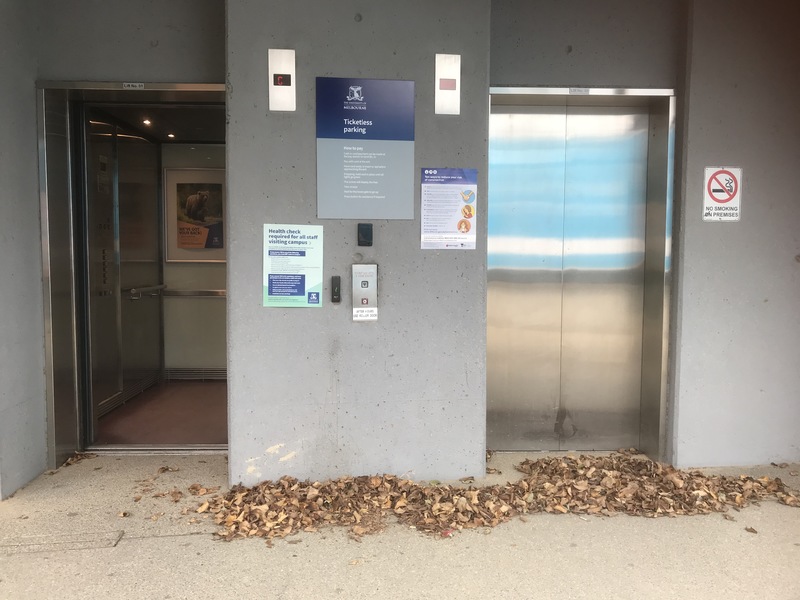
2020-04-17
The University of Melbourne campus has a deserted feel due to access restrictions
-
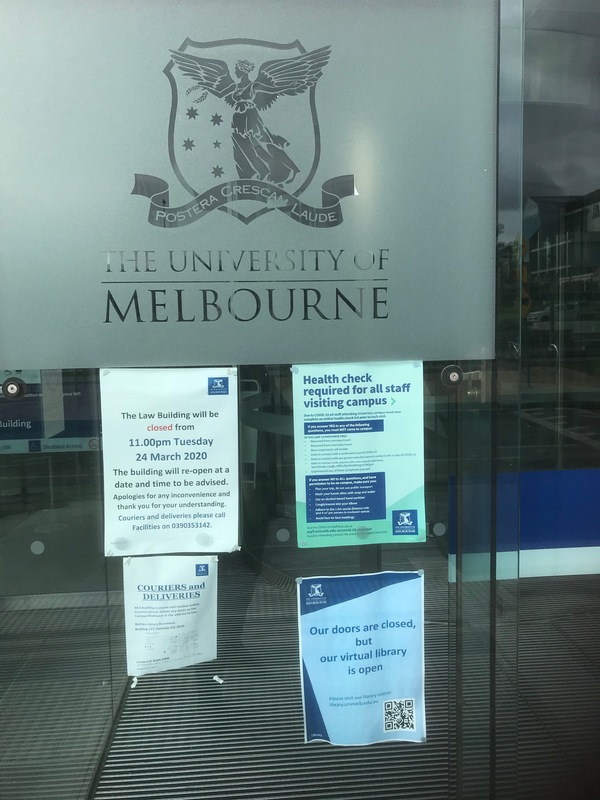
04/17/2020
Access restrictions to the Law Building at the University of Melbourne
-
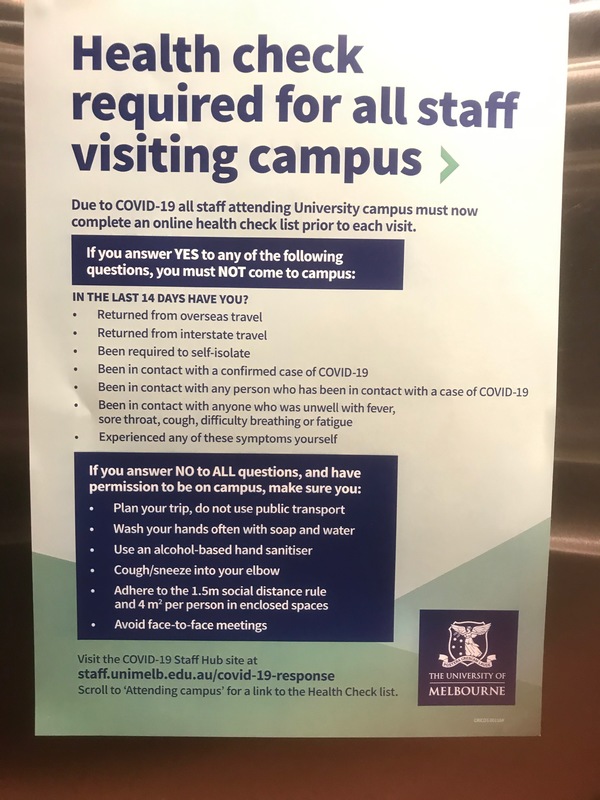
2020-04-17
Access to the University of Melbourne Parkville campus has been restricted for some weeks now
-
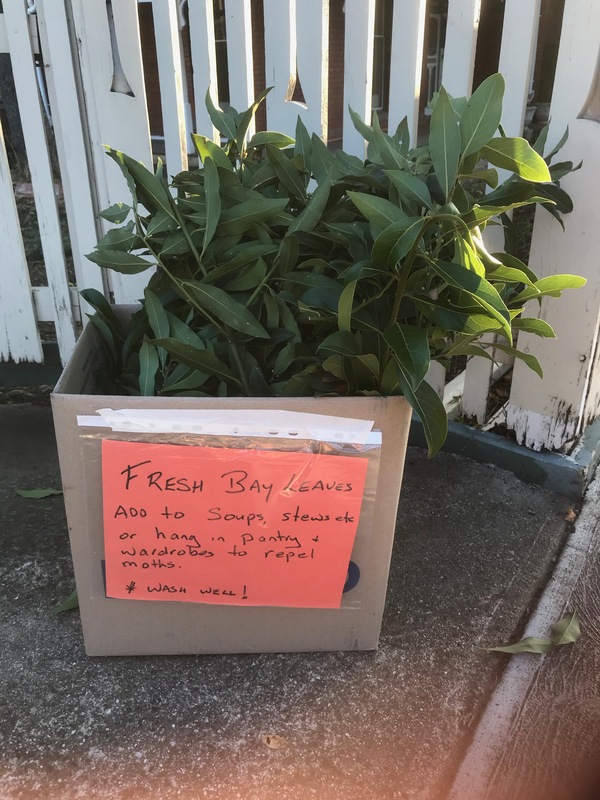
2020-04-09
Neighbours have started up a practice of leaving spare herbs outside their gates for anyone to share
-
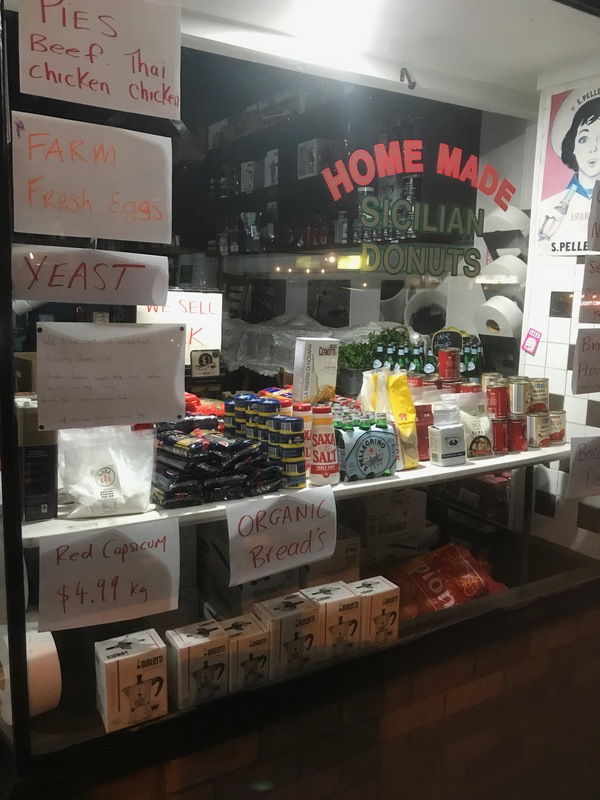
2020-04-08
Local cafes can only serve takeaway so our local Italian cafe Tre Fontane is reinventing itself as an Italian grocer to stay in business
-
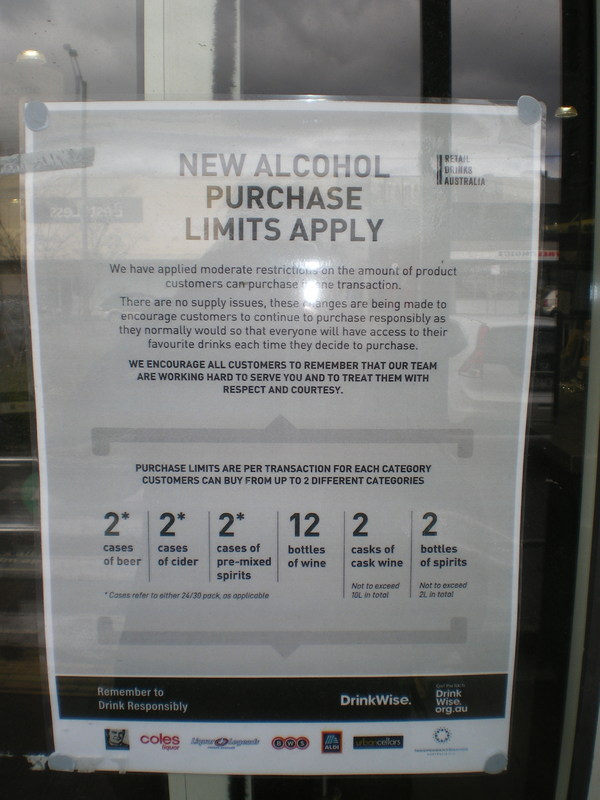
2020-04-21
Notice shows restriction on how much alcohol can be bought in Australia from liquor outlets. The amount had been reduced from previous week.
-
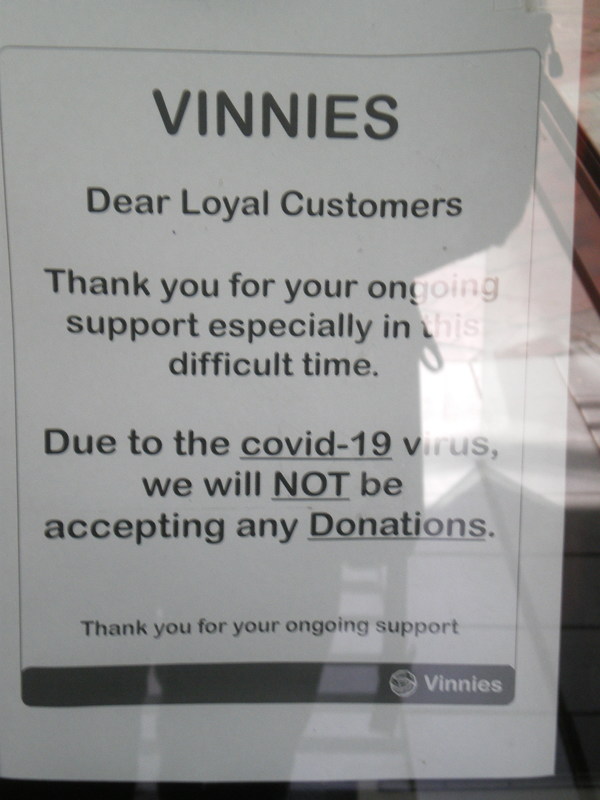
2020-04-21
Another image of a closed down business in regional Australia
-
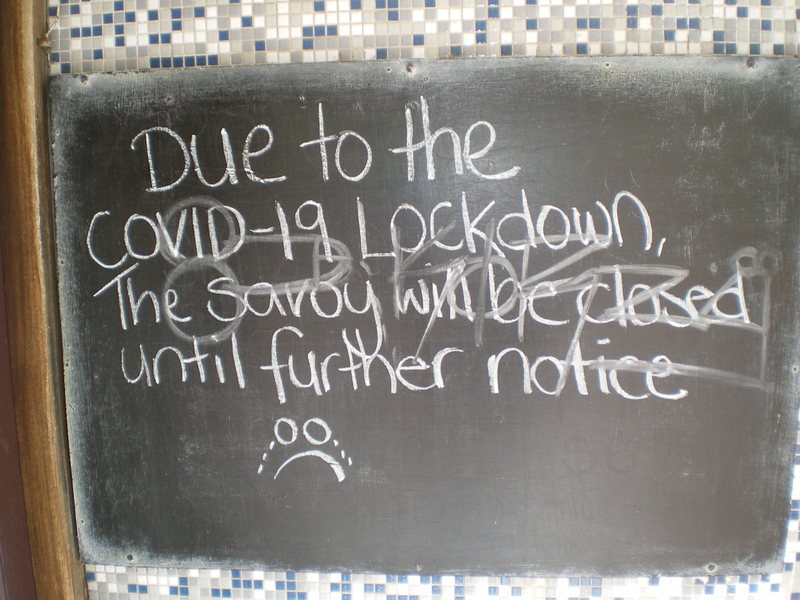
2020-04-21
An image of a closed business in my home town during the lockdown.
-
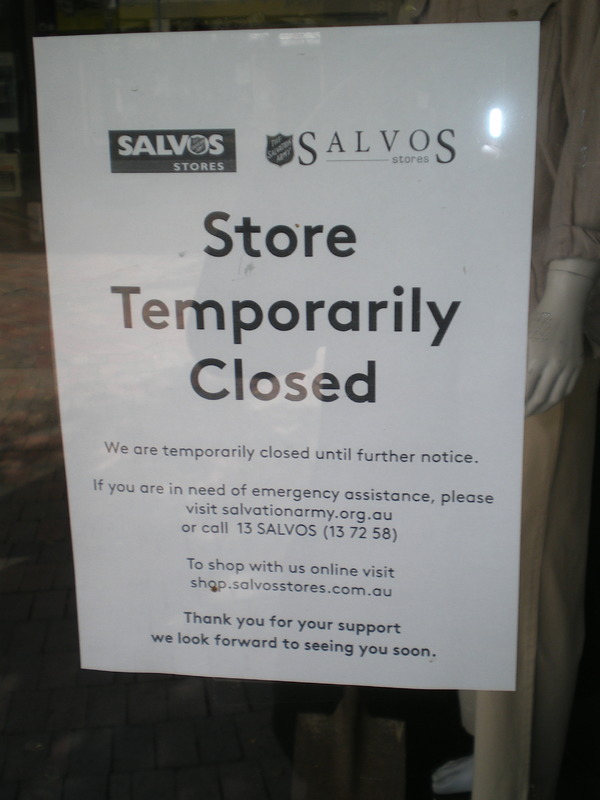
2020-04-21
Shows a notice on the front of a closed down business, Ballarat, Australia
-
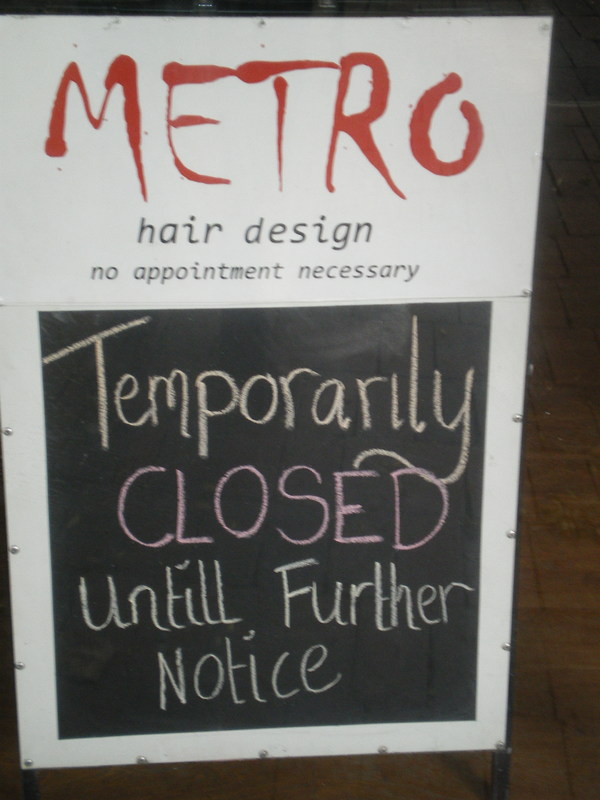
2020-04-21
A picture of a closed business in Ballarat during lockdown.
-
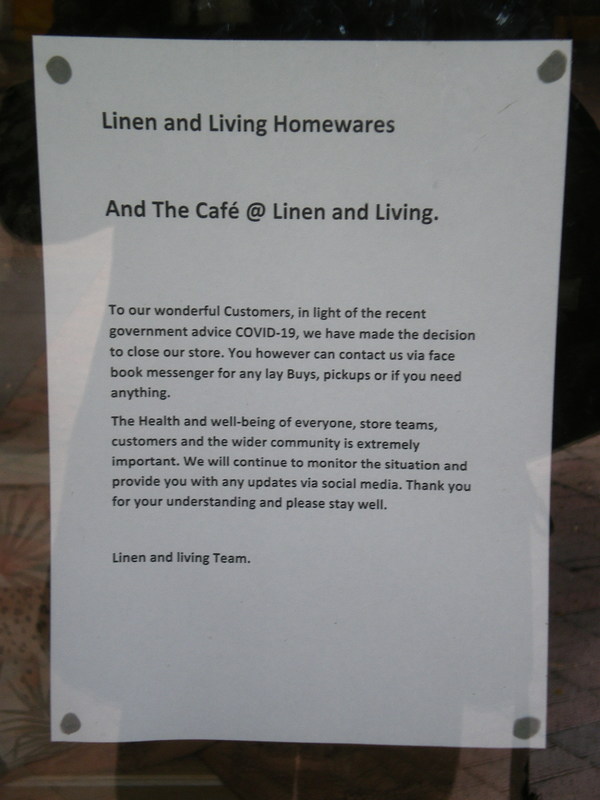
2020-04-21
Image of notice on closed business
-
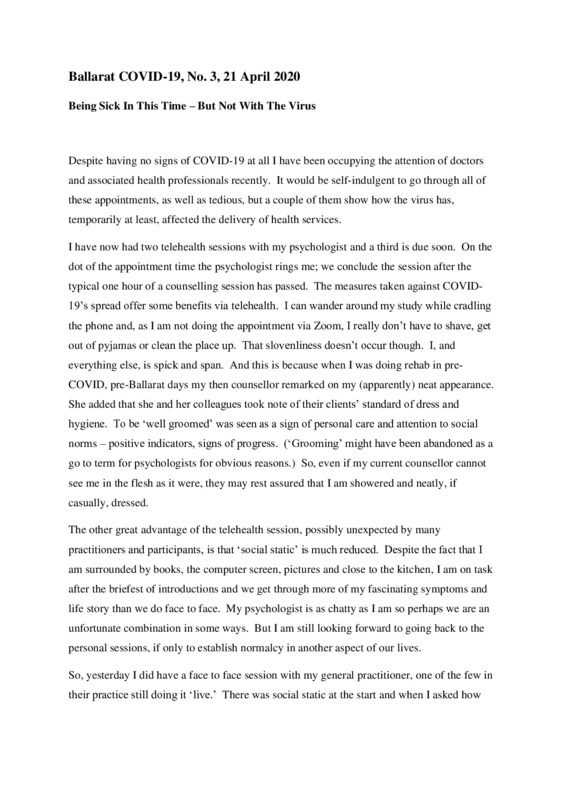
2020-04-21
An account of how lockdown has affected delivery of some medical services
-

09/04/2020
HUM402
This is what the UTas Sandy Bay campus looks like in the time of COVID-19, a vacant cluster of buildings during the academic year.
-
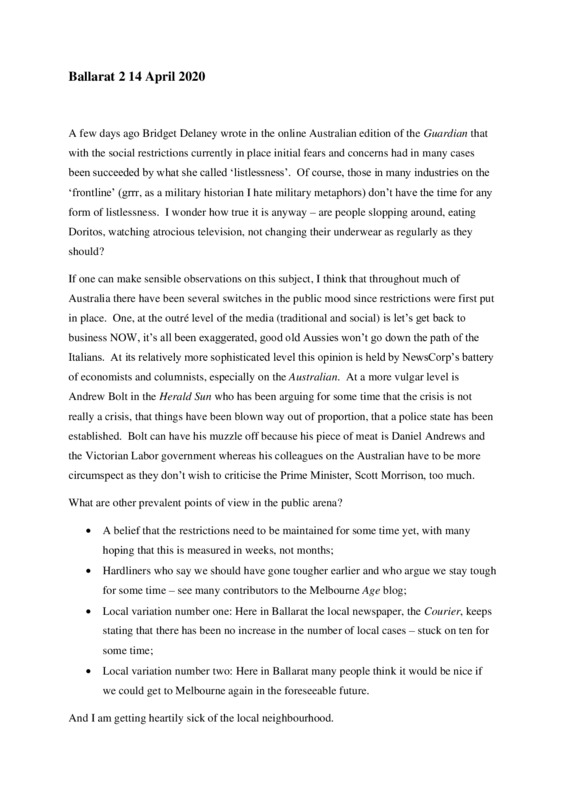
2020-04-14
This is the second set of observations created specifically for this by an historian located in the Australian regional city of Ballarat
-
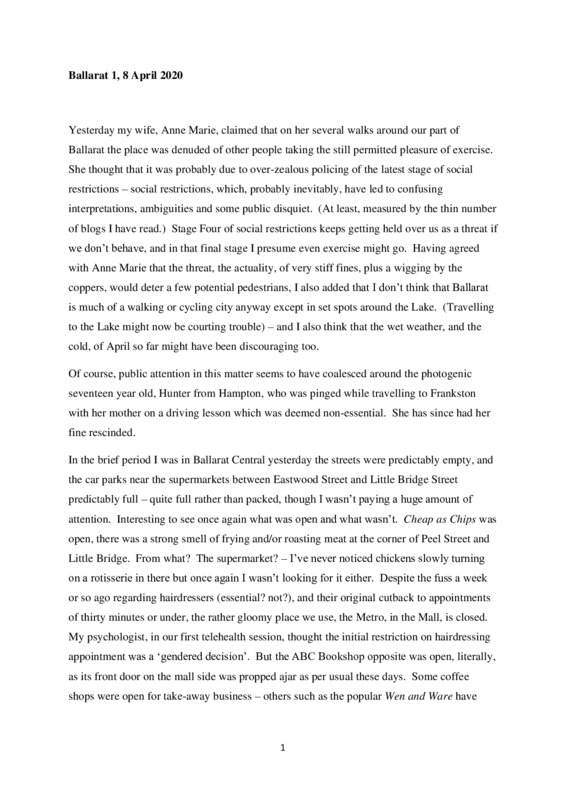
2020-04-08
Personal observation of lockdown in a regional Australian city
-
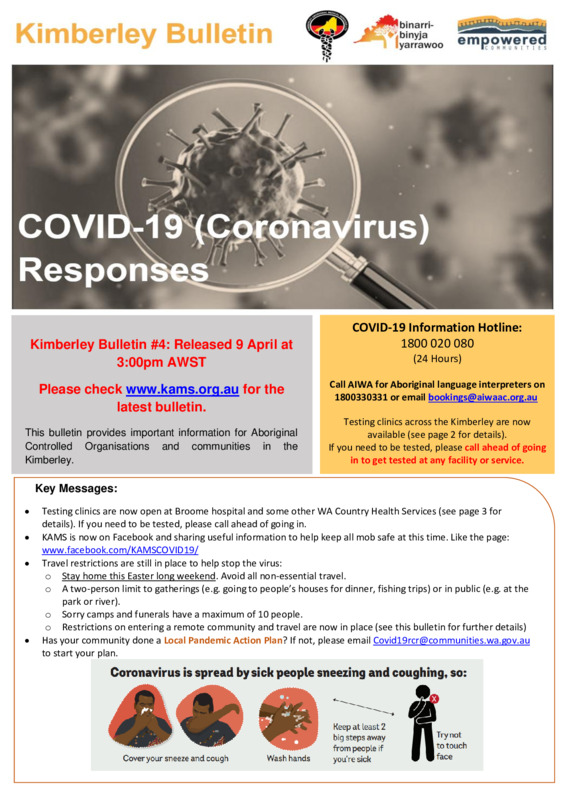
2020-04-09
A regular Covid-19 bulletin issued to local indigenous community members and health providers describing hygiene practices, local travel and safe distancing restrictions, background information on covid-19 and available social support using terminology and cultural examples specific to the region. For example, a 'sorry camp' is special area where visiting relatives would stay when attending a funeral in a community, as communities can be extremely far apart. These are subject to the country-wide limit of a maximum 10 people at funerals current at the time of publication.
Remote Aboriginal and Torres Strait islander communities are considered to be at higher risk of severe impacts from Covid-19 than the wider population due to their higher level of chronic health issues, frequently crowded households, and long distance from healthcare. The Kimberley region of Western Australia has unique travel restrictions in place to limit movement between the four Shires, in addition to restrictions on movement across different regions of Western Australia and lockdowns of individual indigenous communities.
-
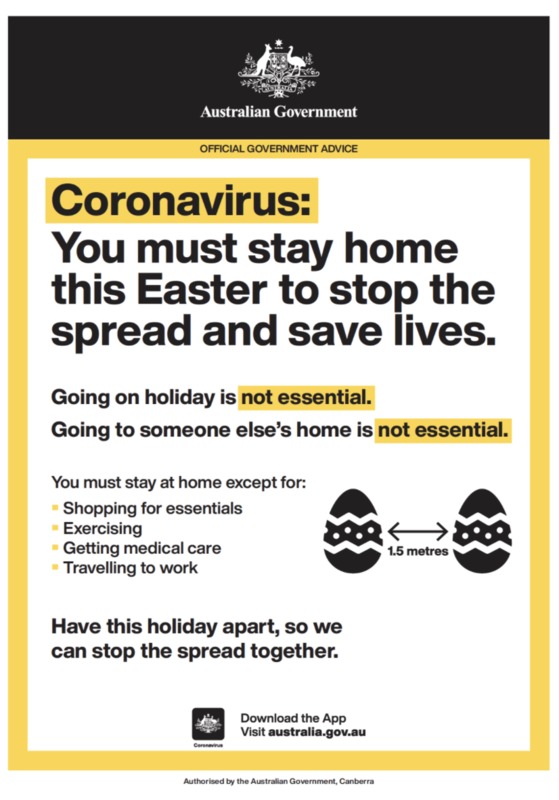
2020-04-12
Australian Government poster advises people to stay at home over the Easter weekend unless shopping for essentials, exercising, getting medical care, or travelling to work
-
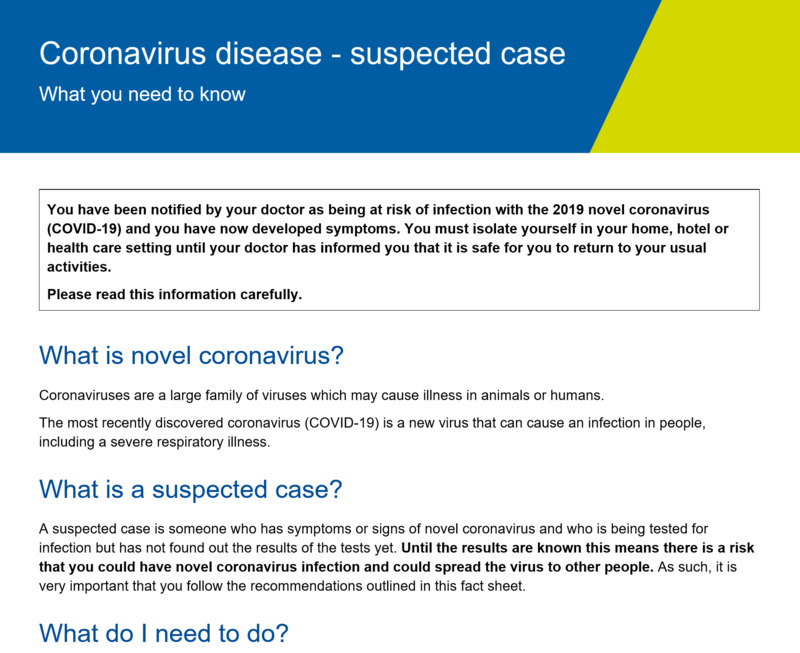
2020-02
Government fact sheet for people who have been notified by their doctor as being at risk of infection and have now developed symptoms.
You have been notified by your doctor as being at risk of infection with the 2019 novel coronavirus (COVID-19) and you have now developed symptoms. You must isolate yourself in your home, hotel or health care setting until your doctor has informed you that it is safe for you to return to your usual activities.
Please read this information carefully.
What is novel coronavirus?
Coronaviruses are a large family of viruses which may cause illness in animals or humans.
The most recently discovered coronavirus (COVID-19) is a new virus that can cause an infection in people, including a severe respiratory illness.
What is a suspected case?
A suspected case is someone who has symptoms or signs of novel coronavirus and who is being tested for infection but has not found out the results of the tests yet. Until the results are known this means there is a risk that you could have novel coronavirus infection and could spread the virus to other people. As such, it is very important that you follow the recommendations outlined in this fact sheet.
What do I need to do?
Your doctor will arrange for you to be tested for the infection. It may take a few days for the test results to be returned. If your symptoms are serious you will need to remain in hospital isolated from other patients to prevent further spread of the virus.
If your doctor says you are well enough to return home while you are waiting for your test results you will need to stay isolated and monitor your symptoms as described below.
Stay at home or in your hotel room
• Isolate yourself at home until you are advised of the results by your doctor.
– You should not leave your house except to seek medical attention.
– You should stay in a different room to other people as much as possible. Use a separate bathroom if available.
– Wear a surgical face mask when you are in the same room as another person and when seeking medical care.
– Do not go to work, school, university, work or attend public places or events. Do not use public transport or taxi services.
• Where possible, get others such as friends or family, who are not required to be isolated, to get food or other necessities for you.
• If you have difficulties getting food or necessities, call 1800 675 398 for support.
• If you need a translator first call 131 450, then request the hotline on 1800 675 398. More information is available on our website: dhhs.vic.gov.au/novelcoronavirus
• Please keep Triple Zero (000) for emergencies only.
Going outside
If you live in a private house, then it is safe for you to go outside into your garden, balcony or courtyard.
If you live in an apartment it is also safe for you to go outside into the garden while wearing a surgical mask. You should, however, go quickly through any common areas on the way to the garden. Wear a surgical mask if you have to move through these areas.
Monitor your symptoms
If your illness gets worse, you should call the doctor who cared for you or the emergency department where you were assessed. If it is a medical emergency (for example, shortness of breath at rest or difficulty breathing) you should:
• Call 000 and request an ambulance
• Inform the ambulance officers that you may have novel coronavirus, and they should take precautions.
What happens if my test is negative?
Your doctor or a Public Health Officer will advise you if you are can cease your isolation. If you were in self-isolation at the time you developed your symptoms, for example because you have been in contact with a confirmed case or travelled to China, you will need to continue isolation until the 14 days since last contact with the confirmed case or from your arrival in Australia.
You should continue to carefully monitor your health for up to 14 days after your last contact with the confirmed case. Report any new or returning symptoms to your doctor in this period. You may be required to be tested again.
You do not require medical clearance to return to work, university or school. If you have stayed in isolation and remain well, then they are safe to return to their usual activities.
What happens if my test is positive?
A Public Health Officer will contact you to find out more information from you and provide you with further information. You must remain in your home or accommodation until further tests are completed and you have become well. After a discussion, a specialist may be involved to further assess your illness. A Public Health Officer will conduct an assessment to advise when it is safe to return to normal activities.
If your condition deteriorates, seek medical attention:
• Notify the department or Public Health Officer managing your care by calling the number provided to you.
• Follow the direction of the Public Health Officer who may advise you to go to a doctor or a hospital, and will agree with you how you should get there.
• Call ahead to the doctor or hospital and inform them that you are a confirmed case of novel coronavirus.
• If you need to leave your home or accommodation to seek medical attention, put on the mask provided to you.
• When you arrive at the doctor’s surgery or hospital, tell them that you are a confirmed case of novel coronavirus.
If you are experiencing severe symptoms, such as shortness of breath:
• Call 000 and request an ambulance
• Inform the ambulance officers that you have novel coronavirus.
People who you have had close contact with including family members and people you live with will need to isolate themselves for 14 days since their last contact with you.
Looking after your well-being during isolation
Being confined to home for an extended period of time can cause stress and conflict. Tips for looking after yourself include:
• Talk to the other members of the family about the infection. Understanding novel coronavirus will reduce anxiety.
• Reassure young children using age-appropriate language.
• Think about how you have coped with difficult situations in the past and reassure yourself that you will cope with this situation too. Remember that self-isolation won’t last for long.
• Exercise regularly. Options could include exercise DVDs, dancing, floor exercises, yoga, walking around the backyard or using home exercise equipment, such as a stationary bicycle, if you have it. Exercise is a proven treatment for stress and depression.
• Keep in touch with family members and friends via telephone, email or social media.
• Keep up a normal daily routine as much as possible.
• Arrange with your employer to work from home, if possible.
• Ask your child’s school to supply assignments, work sheets and homework by post or email, or if the student can join the class using online options.
• Don’t rely too heavily on the television and technology. Treat self-isolation as an opportunity to do some of those things you never usually have time for, such as board games, craft, drawing and reading.
• If you are struggling to cope you call Lifeline on 13 11 14 or Beyond Blue on 1300 22 4636.
Where can I find out more information?
Call the Department of Health and Human Services on to discuss any questions you have. If you need a translator first call 131 450, then request the hotline on 1300 651 160.
For Victorian updates to the current incident, go to: https://www.dhhs.vic.gov.au/novelcoronavirus
For national updates: https://www.health.gov.au/news/latest-information-about-novel-coronavirus
For international updates: https://www.who.int/westernpacific/emergencies/novel-coronavirus
WHO resources https://www.who.int/health-topics/coronavirus
-
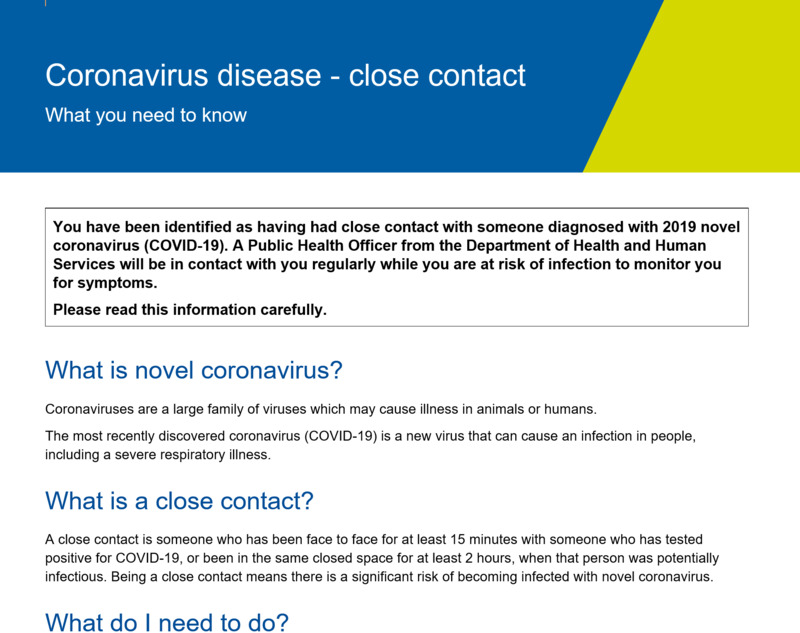
2020-02
Government fact sheet for people who "have been identified as having had close contact with someone diagnosed with 2019 novel coronavirus (COVID-19)", Version 1.3
You have been identified as having had close contact with someone diagnosed with 2019 novel coronavirus (COVID-19). A Public Health Officer from the Department of Health and Human Services will be in contact with you regularly while you are at risk of infection to monitor you for symptoms.
Please read this information carefully.
What is novel coronavirus?
Coronaviruses are a large family of viruses which may cause illness in animals or humans.
The most recently discovered coronavirus (COVID-19) is a new virus that can cause an infection in people, including a severe respiratory illness.
What is a close contact?
A close contact is someone who has been face to face for at least 15 minutes with someone who has tested positive for COVID-19, or been in the same closed space for at least 2 hours, when that person was potentially infectious. Being a close contact means there is a significant risk of becoming infected with novel coronavirus.
What do I need to do?
Stay at home or in your hotel room
• Isolate yourself at home until 14 days after you were last exposed to the infectious person.
– You should not leave your house except to seek medical attention.
– You should stay in a different room to other people as much as possible. Use a separate bathroom if available.
– Do not go to work, school, university, work or attend public places or events. Do not use public transport or taxi services.
– Where possible, get others such as friends or family, who are not required to be isolated, to get food or other necessities for you.
• If you have difficulties getting food or necessities, call 1800 675 398 for support.
• If you need a translator first call 131 450, then request the hotline on 1800 675 398. More information is available on our website: dhhs.vic.gov.au/novelcoronavirus
• Please keep Triple Zero (000) for emergencies only.
Going outside
If you live in a private house, then it is safe for you to go outside into your garden, balcony or courtyard.
If you live in an apartment it is also safe for you to go outside into the garden while wearing a surgical mask. You should, however, go quickly through any common areas on the way to the garden. Wear a surgical mask if you have to move through these areas.
Monitor your symptoms
• Monitor your health until 14 days after you were last exposed to the infectious person.
• Watch for any of these signs and symptoms:
– fever
– cough
– shortness of breath
• Other early symptoms can include chills, body aches, sore throat, headache, runny nose, muscle pain or diarrhoea.
You will be contacted daily by a Public Health Officer to check whether you have had symptoms.
What if I develop symptoms?
If you develop any of the symptoms listed above:
• Call a doctor or hospital and inform them that you have had contact with a confirmed case of novel coronavirus and you have symptoms.
• Put on a mask if you have one.
• Keep yourself away from others (for example, in a different room).
• Do not go to work, school, university, work or attend public places or events. Do not use public transport or taxi services.
• When you arrive at the general practice or hospital, tell them again that you are a contact of a confirmed case of novel coronavirus.
Your doctor or staff at the hospital emergency department will ensure you are wearing a mask and take you through to a room away from others.
The doctor will contact our department on 1300 651 160. They may organise to take nose and throat swabs to send for testing for the novel coronavirus.
If you are experiencing severe symptoms, such as shortness of breath:
• Call 000 and request an ambulance.
• Inform the ambulance officers that you have been in close contact with a confirmed case of novel coronavirus.
How can I prevent the spread of the virus?
Practising good hand and sneeze/cough hygiene is the best defence:
• Wash your hands often with soap and water before and after eating as well as after attending the toilet.
• Avoid all contact with others.
• Cough and sneeze into your elbow.
Should I wear a face mask?
Face masks are not recommended if you do not have symptoms. A facemask will not protect you against becoming infected.
If you are ill, you should put on a mask if you have one to prevent spreading the infection to others. You will be given a mask to wear by your doctor.
Looking after your well-being during isolation
Being confined to home for an extended period of time can cause stress and conflict. Tips for looking after yourself include:
• Talk to the other members of the family about the infection. Understanding novel coronavirus will reduce anxiety.
• Reassure young children using age-appropriate language.
• Think about how you have coped with difficult situations in the past and reassure yourself that you will cope with this situation too. Remember that self-isolation won’t last for long.
• Exercise regularly. Options could include exercise DVDs, dancing, floor exercises, yoga, walking around the backyard or using home exercise equipment, such as a stationary bicycle, if you have it. Exercise is a proven treatment for stress.
• Keep in touch with family members and friends via telephone, email or social media.
• Keep up a normal daily routine as much as possible.
• Arrange with your employer to work from home, if possible.
• Ask your child’s school to supply assignments, work sheets and homework by post or email, or if the student can join the class using online options.
• Don’t rely too heavily on the television and technology. Treat self-isolation as an opportunity to do some of those things you never usually have time for, such as board games, craft, drawing and reading.
• If you are struggling to cope you call Lifeline on 13 11 14 or Beyond Blue on 1300 22 4636.
Where can I find out more information?
Call the Department of Health and Human Services on to discuss any questions you have. If you need a translator first call 131 450, then request the to be put through to the department on 1300 651 160.
For Victorian updates to the current incident, go to: https://www.dhhs.vic.gov.au/novelcoronavirus
For national updates: https://www.health.gov.au/news/latest-information-about-novel-coronavirus
For international updates: https://www.who.int/westernpacific/emergencies/novel-coronavirus
WHO resources https://www.who.int/health-topics/coronavirus
-
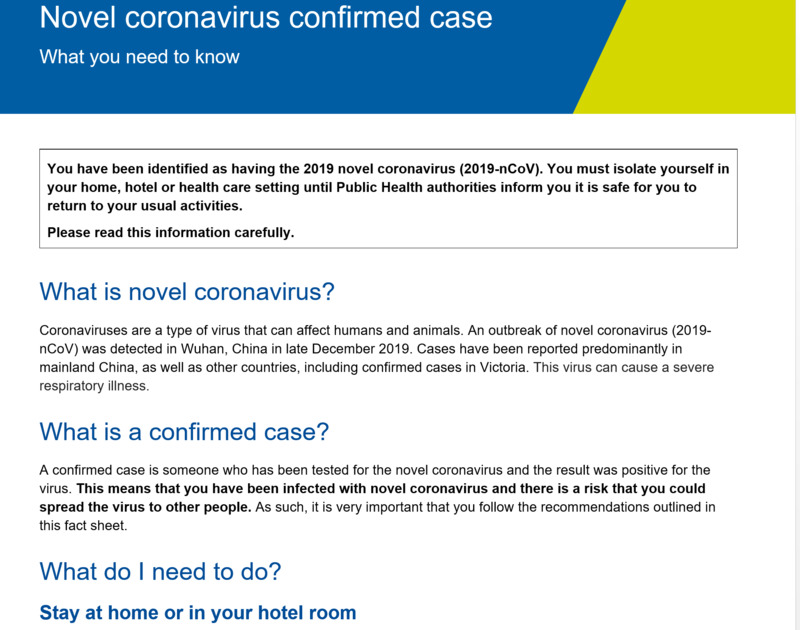
2020-02-11
Government advice to people who have "2019 novel coronavirus (2019-nCoV)".
-
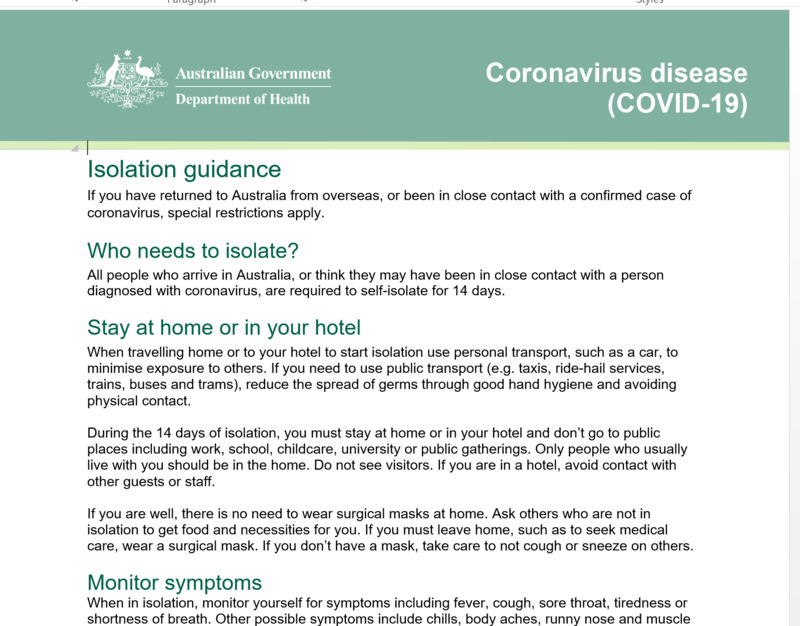
2020-03-23
Australian Government fact sheet with guidance on self-isolation, Version 14
Isolation guidance
If you have returned to Australia from overseas, or been in close contact with a confirmed case of coronavirus, special restrictions apply.
Who needs to isolate?
All people who arrive in Australia, or think they may have been in close contact with a person diagnosed with coronavirus, are required to self-isolate for 14 days.
Stay at home or in your hotel
When travelling home or to your hotel to start isolation use personal transport, such as a car, to minimise exposure to others. If you need to use public transport (e.g. taxis, ride-hail services, trains, buses and trams), reduce the spread of germs through good hand hygiene and avoiding physical contact.
During the 14 days of isolation, you must stay at home or in your hotel and don’t go to public places including work, school, childcare, university or public gatherings. Only people who usually live with you should be in the home. Do not see visitors. If you are in a hotel, avoid contact with other guests or staff.
If you are well, there is no need to wear surgical masks at home. Ask others who are not in isolation to get food and necessities for you. If you must leave home, such as to seek medical care, wear a surgical mask. If you don’t have a mask, take care to not cough or sneeze on others.
Monitor symptoms
When in isolation, monitor yourself for symptoms including fever, cough, sore throat, tiredness or shortness of breath. Other possible symptoms include chills, body aches, runny nose and muscle pain.
What do I do if I get sick?
If you develop symptoms (fever, a cough, sore throat, tiredness or shortness of breath) within 14 days of returning to Australia, or within 14 days of last contact of a confirmed case, you should arrange to see a doctor for urgent assessment.
You should telephone the health clinic or hospital before you arrive and tell them your travel history or that you have been in contact with a confirmed case of coronavirus.
You must remain isolated either in your home, hotel or a healthcare setting until public health authorities inform you it is safe for you to return to your usual activities.
How can I prevent the spread of coronavirus?
Practising good hand and sneeze/cough hygiene and keeping your distance from others when you are sick is the best defence against most viruses. You should:
• wash your hands frequently with soap and water, including before and after eating, and after going to the toilet
• cover your cough and sneeze, dispose of tissues, and wash your hands
• avoid contact with others (stay more than 1.5 metres from people)
• stay at home if unwell.
Going outside
If you live in a private house, it is safe for you to go into your garden or courtyard. If you live in an apartment or are staying in a hotel, it is also safe for you to go into the garden but you should wear a surgical mask to minimise risk to others and move quickly through any common areas.
Advice for others living with you
Others that live with you are not required to be isolated unless they meet one of the isolation criteria outlined above. If you develop symptoms and are confirmed to have coronavirus, they will be classified as close contacts and will need to be isolated.
Cleaning
To minimise the spread of any germs you should regularly clean surfaces that are frequently touched such as door handles, light switches, kitchen and bathroom areas. Clean with household detergent or disinfectant.
Managing the 14 day isolation
Being in isolation can be stressful and boring. Suggestions include:
• Keep in touch with family members and friends via telephone, email or social media.
• Learn about coronavirus and talk with others.
• Reassure young children using age-appropriate language.
• Where possible, keep up normal daily routines, such as eating and exercise.
• Arrange to work from home.
• Ask your child’s school to supply assignments or homework by post or email.
• Do things that help you relax and use isolation as an opportunity to do activities you don’t usually have time for.
More information
For the latest advice, information and resources, go to www.health.gov.au
Call the National Coronavirus Helpline on 1800 020 080. It operates 24 hours a day, seven days a week. If you require translating or interpreting services, call 131 450.
The phone number of your state or territory public health agency is available at www.health.gov.au/state-territory-contacts
If you have concerns about your health, speak to your doctor.
-
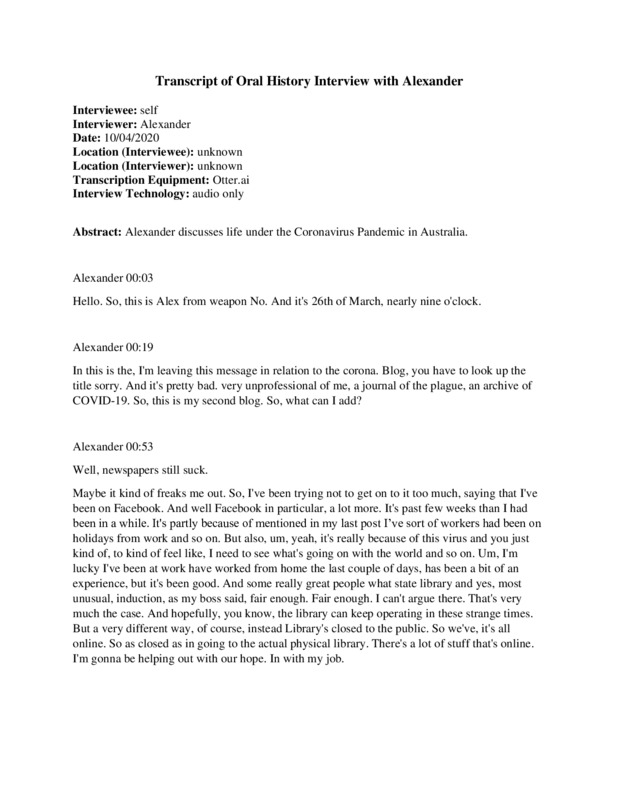
03/26/2020
Rounding up what I've been doing since the first log I posted on March 24. There was a few things I felt like I didn't cover very well originally.
-
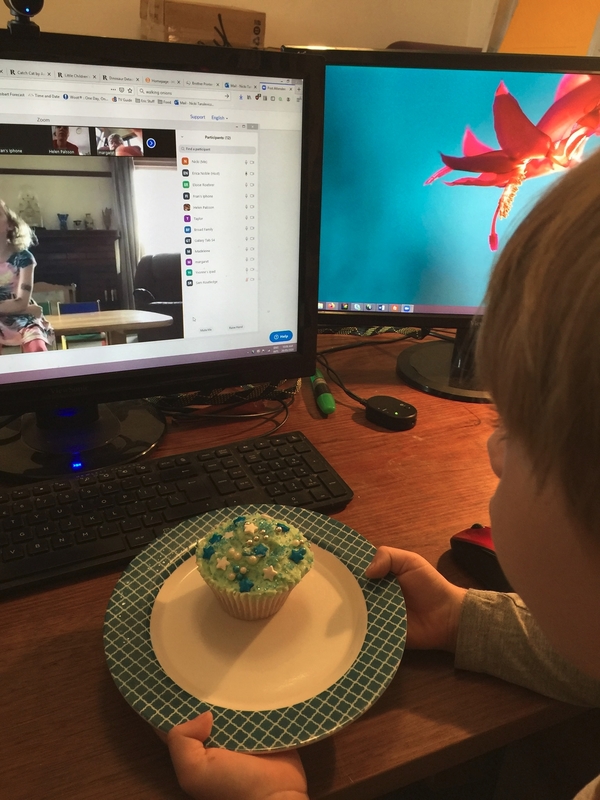
2020-03-29
One of my son's classmates turned 5. We were invited to make cupcakes and zoom into a celebration - it felt poignant, and incomplete.
-
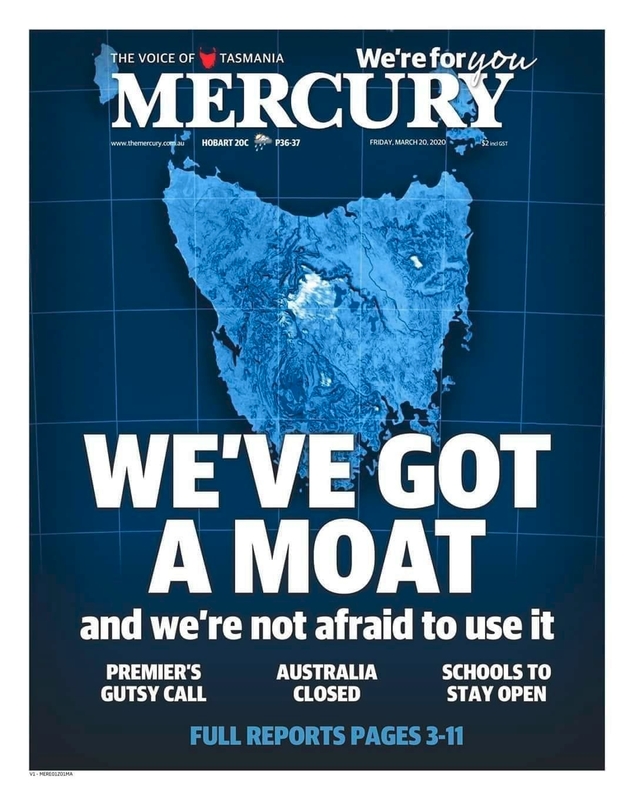
2020-03-20
This captures the island nature of Tasmania - Australian but not. I saw it the first day of a 14 day travel related isolation, a moat within a moat
-
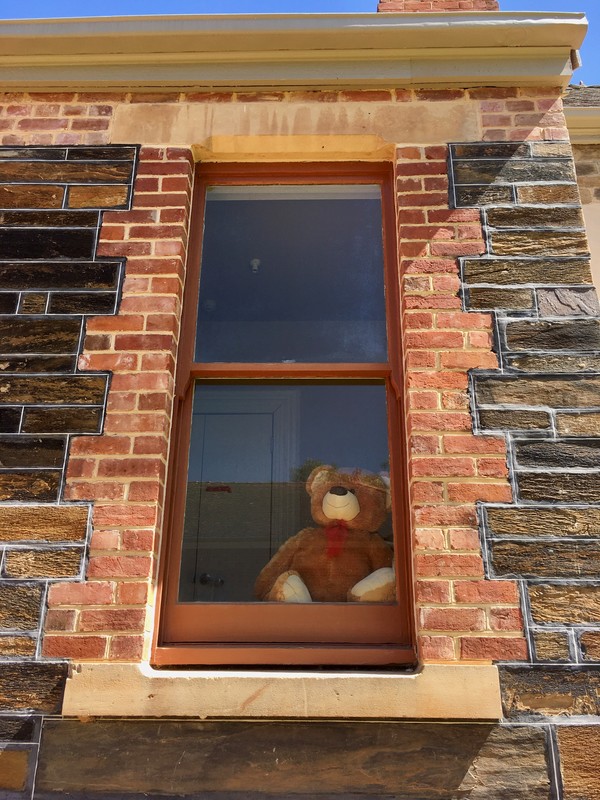
2020-03-25
Inspired by the book 'Going On A Bear Hunt' by Michael Rosen and Helen Oxenbury, people across Adelaide started putting teddy bears in their windows for children to find when they were out walking. Like all museums in Australia, Urrbrae House (a historic house museum} was closed to public visitors due to Covid-19 social distancing restrictions. So during the museum's closure, the Urrbrae House manager decided to put three teddy bears - Mama, Papa and Baby Bear - in various windows of the building for local children to spot. She then alerted people to look out for the bears via social media with the following post: "Mama, Papa and Baby Bear at Urrbrae House heard that bears all over Adelaide were sitting in windows to enjoy the sun and offer a smile to anyone going by while on a safe social distancing walk. While the museum is closed and our bears are in social isolation, they thought this was a splendid idea and have joined in."
The picture represents one way people tried to remain connected during the pandemic and a desire to bring joy to children and their families at an uncertain time.
-
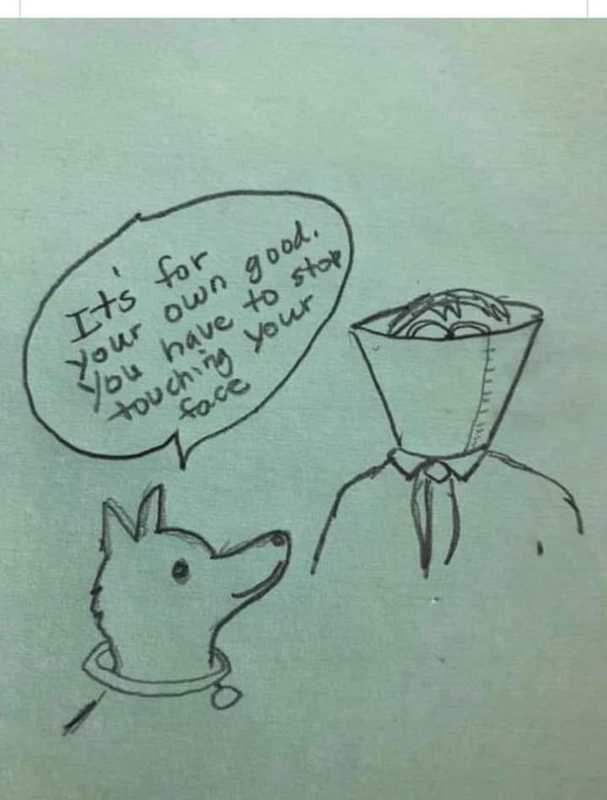
2020-04-08
A person wearing a cone and a dog responding by saying "this is for your own good to not touch your face."
-
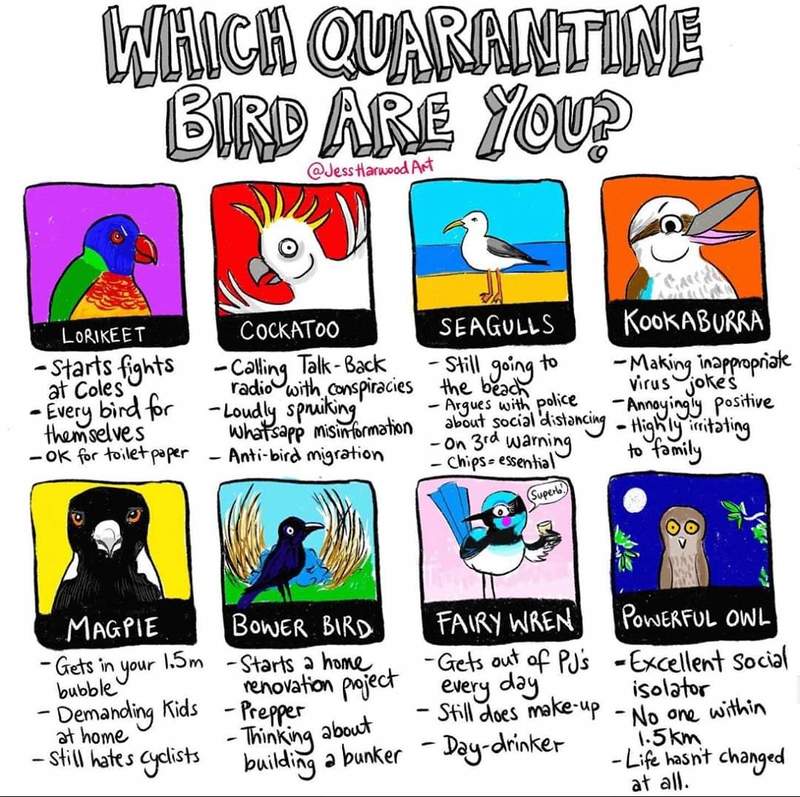
2020-04-08
If gun shops are an essential service in the US, then cartoonists should be an essential service for us.
-
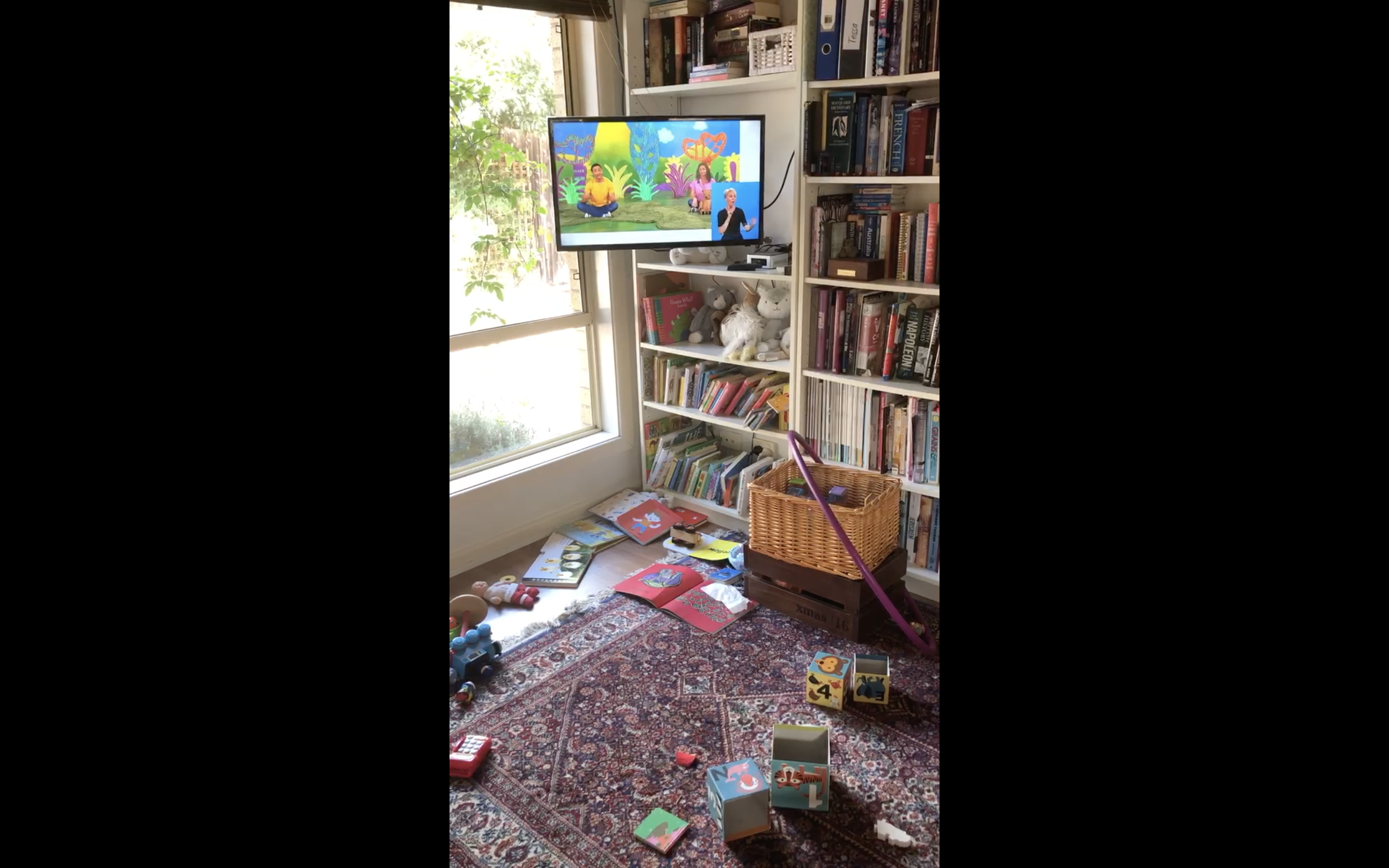
2020-04-03
Play School screened a special on COVID-19 that explained the situation to kids. This clip is from the start of the half hour program. The program included explanations of how germs are spread and a song about washing your hands.
-
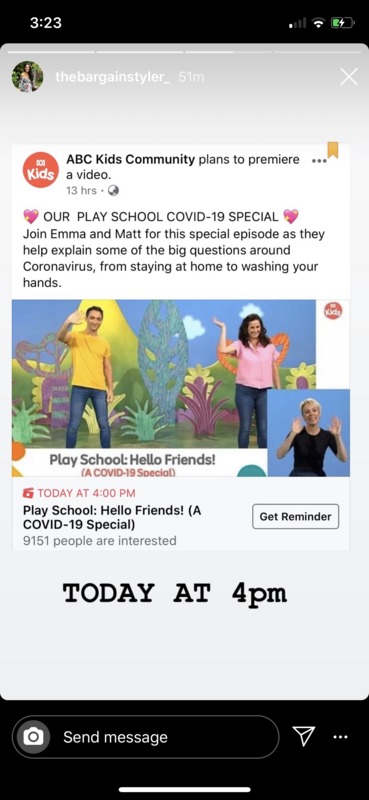
2020-04-02
Play School, a kids program made by the Australian National Broadcaster (ABC) screened a COVID-19 special explaining the situation to kids.
-
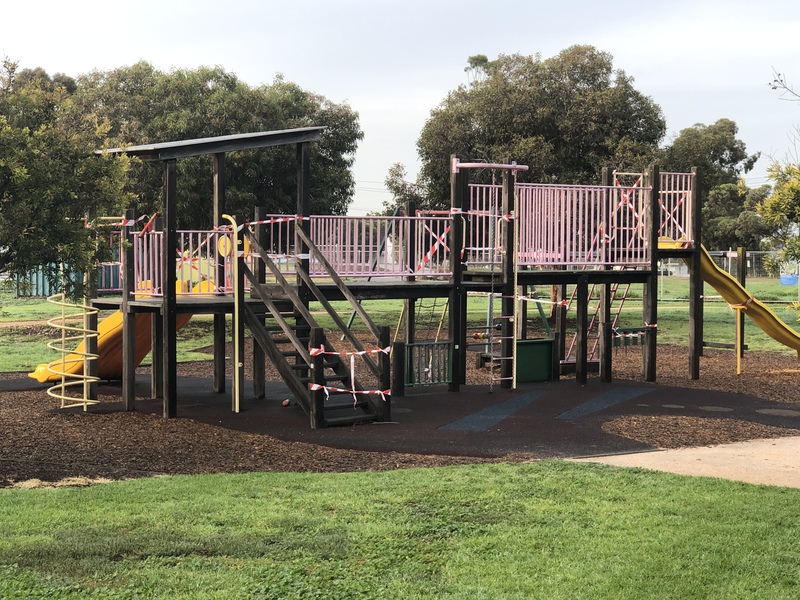
2020-04-03
Photograph of a cordoned off playground. Playgrounds have been closed to stop people gathering.
-
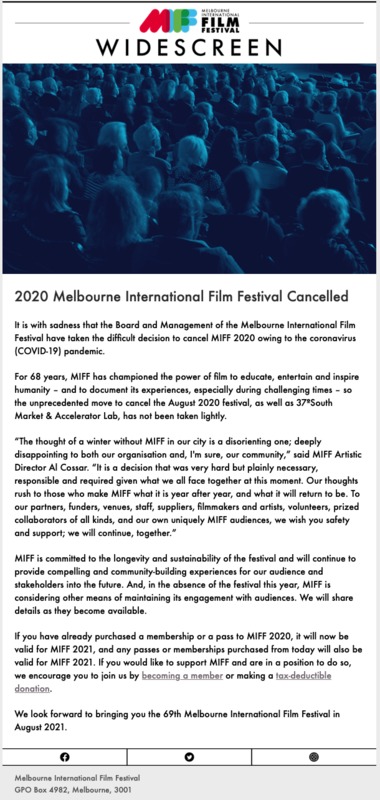
2020-04-07
Announcement of cancellation of the 2020 Melbourne International Film Festival due to the pandemic
-
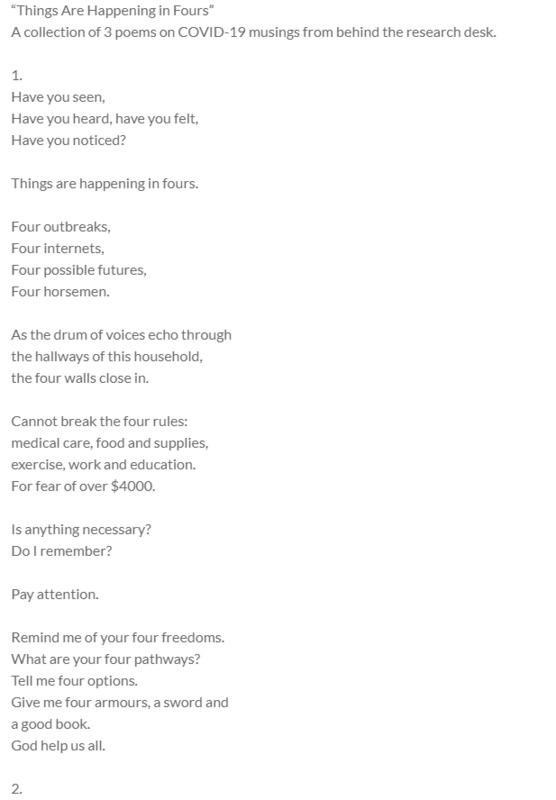
2020-04-01
Poems relating to COVID
-
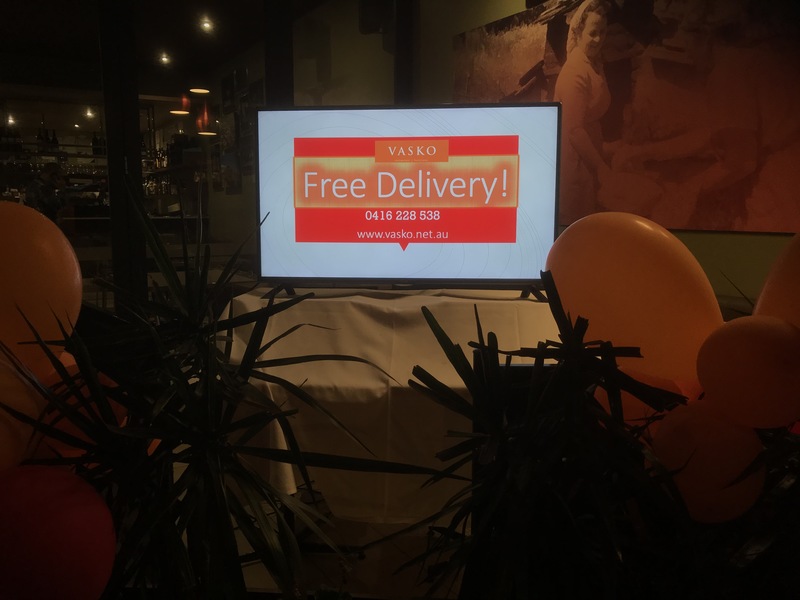
2020-04-06
Suburban restaurant Vasko (111-113 Upper Heidelberg Road, Ivanhoe) offering free delivery
-
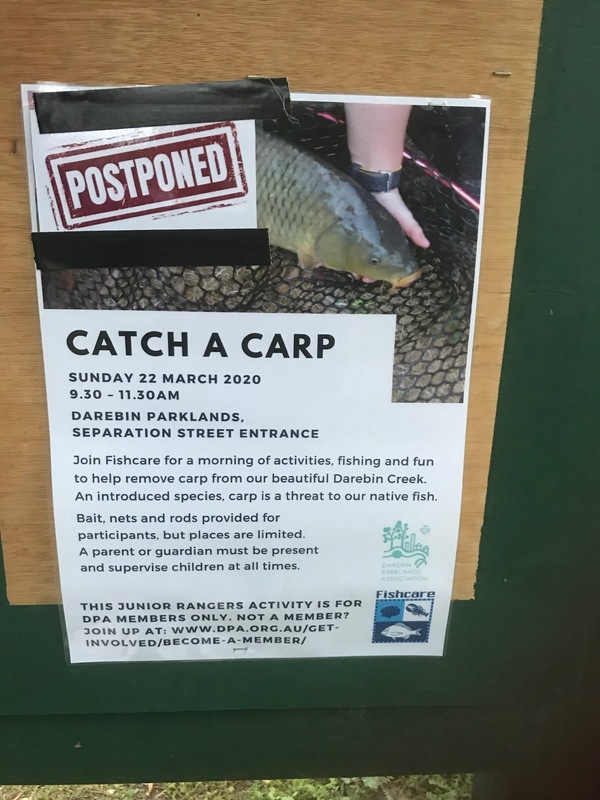
2020-03-22
Postponement of Fishcare event to remove introduced carp from local river system
-
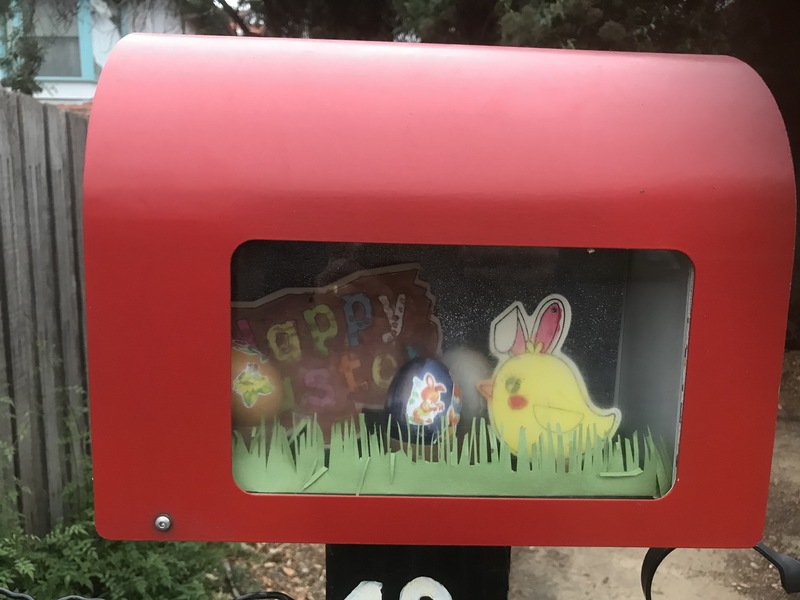
2020-04-06
Easter message in letterbox art
-
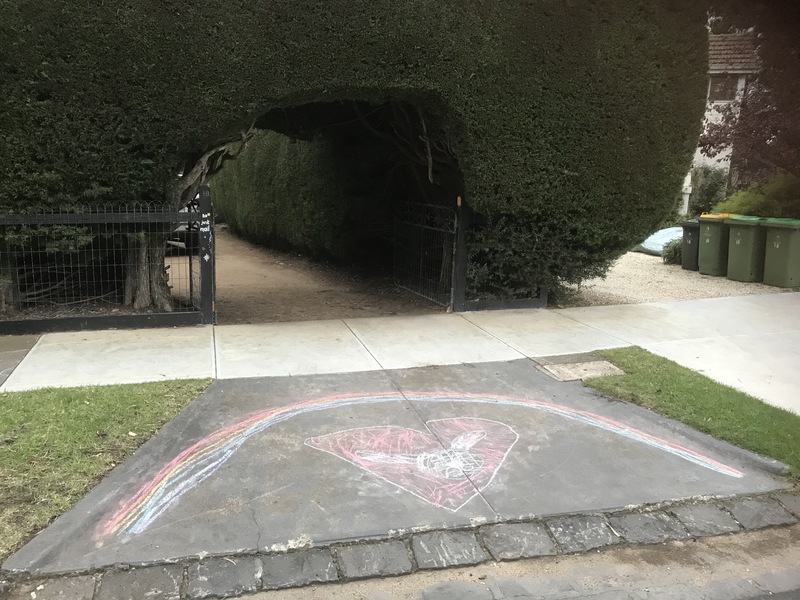
2020-04-06
Chalked messages and pictures of hope
-
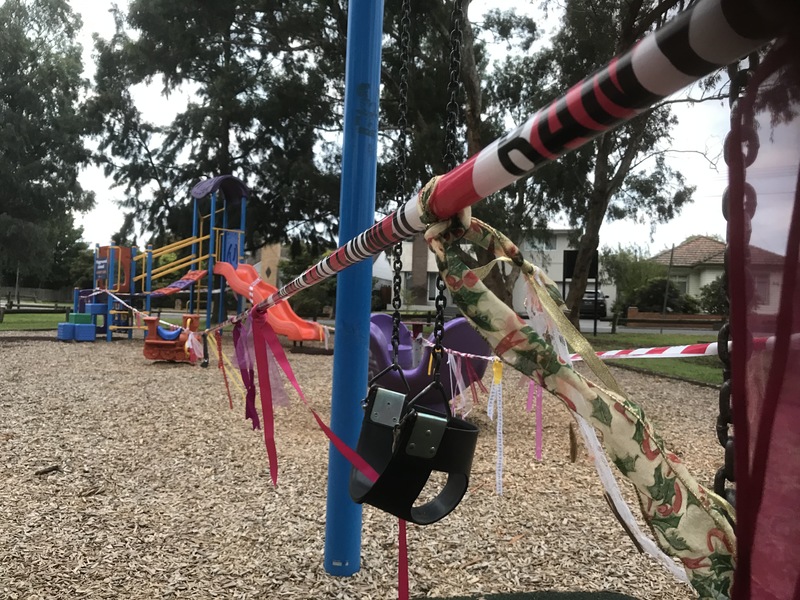
2020-04-06
All the local playgrounds closed at the end of March and now the kids have decorated the Council tape — Rossi Reserve in Ford Street, Ivanhoe.
-
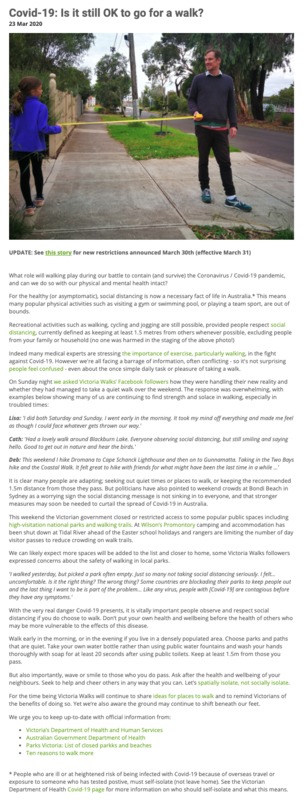
2020-03-23
Advice about walking, and how it is making people feel
-
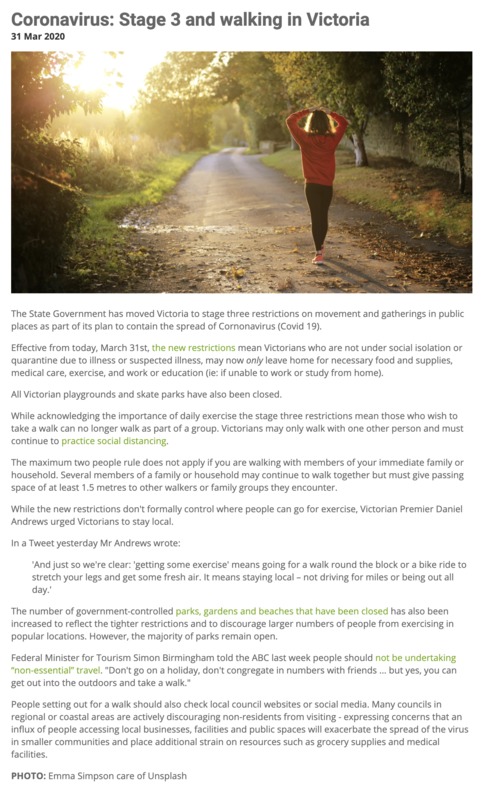
2020-03-31
Victorian State Government advice about walking
-
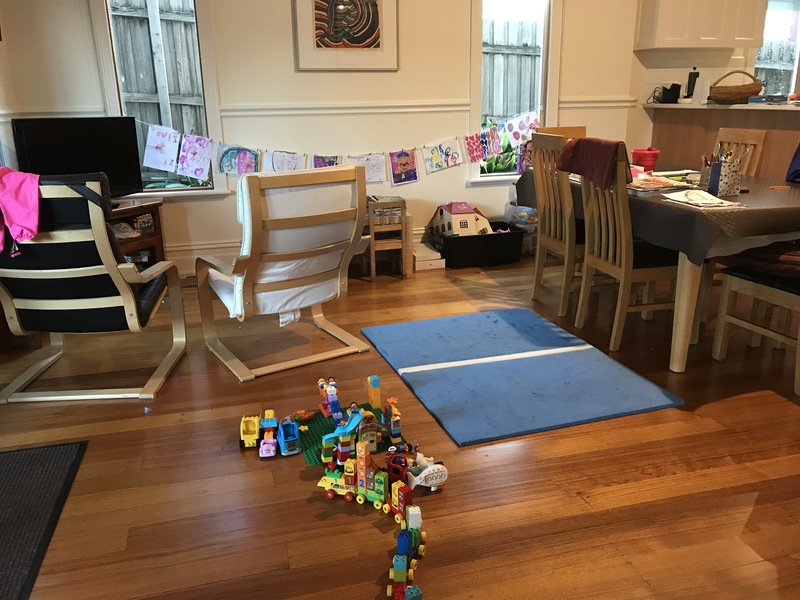
2020-04-06
Working from home with a child.
-
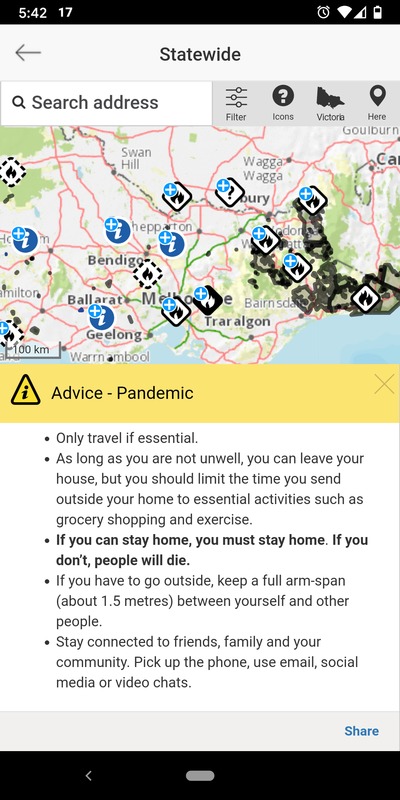
2020-03-27
I have the VicEmergency app on my phone to warn for bushfires. Around mid March, I started getting daily warning alerts from the app, initially for contagious disease in my area, and then for pandemic in my area. The alerts usually come between 5-6pm and provide information on the latest public health advice and restrictions. On Friday 27 March the alert from the app was particularly striking. One of the instructions, highlighted in bold, told people "If you can stay home, you must stay home. If you don't, people will die." This felt like very dire warning from what is otherwise rather a dry app with very practical instructions.
-
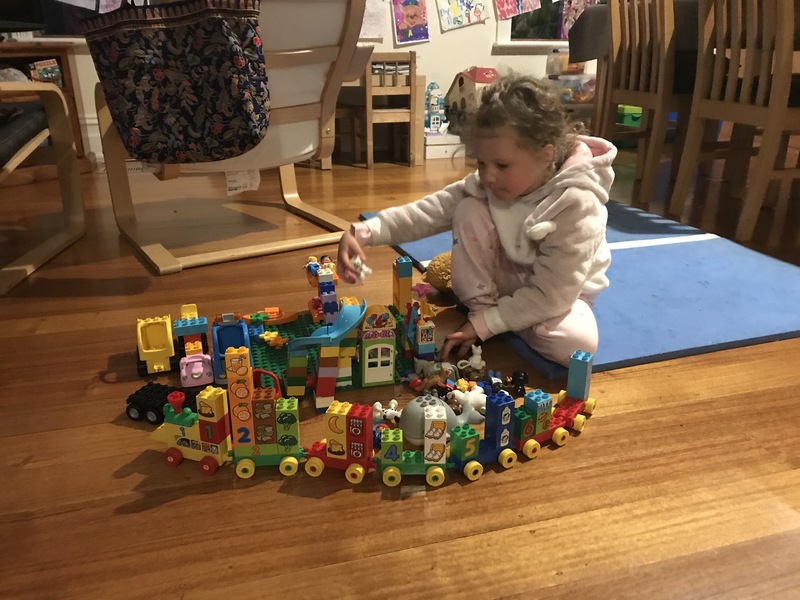
2020-04-06
Our life at the moment in the home office cum kindergarten. From morning and some semblance of tidiness, to increasing clutter as the day progresses.
-
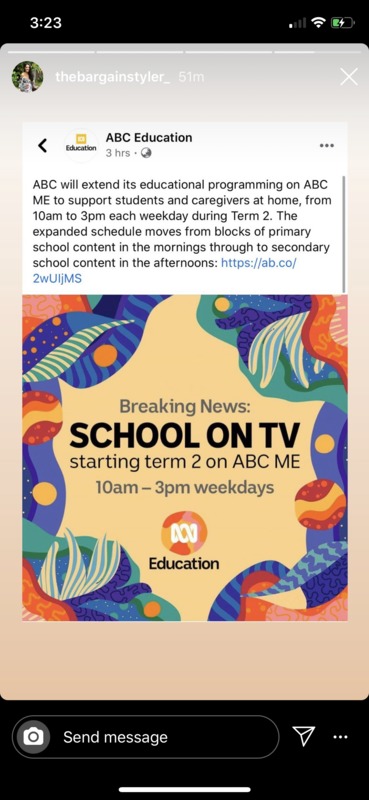
2020-04-02
A Facebook announcement from ABC Education (Australia) about screening educational content in term two. They will be screening primary school content in the morning and high school content in the afternoon.
-
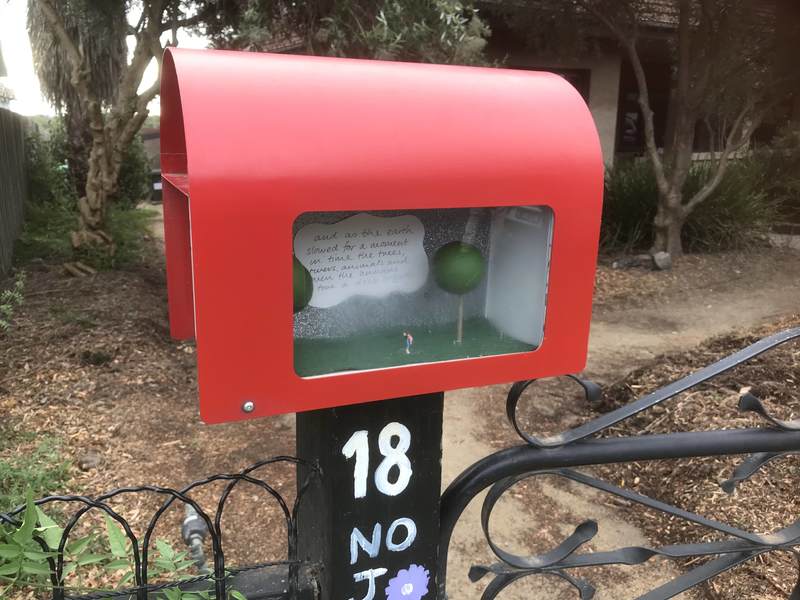
2020-04-03
Message to passers-by in suburban letterbox: "And as the earth slowed for a moment in time the trees, rivers, animals and even the humans took a deep breath …".
-
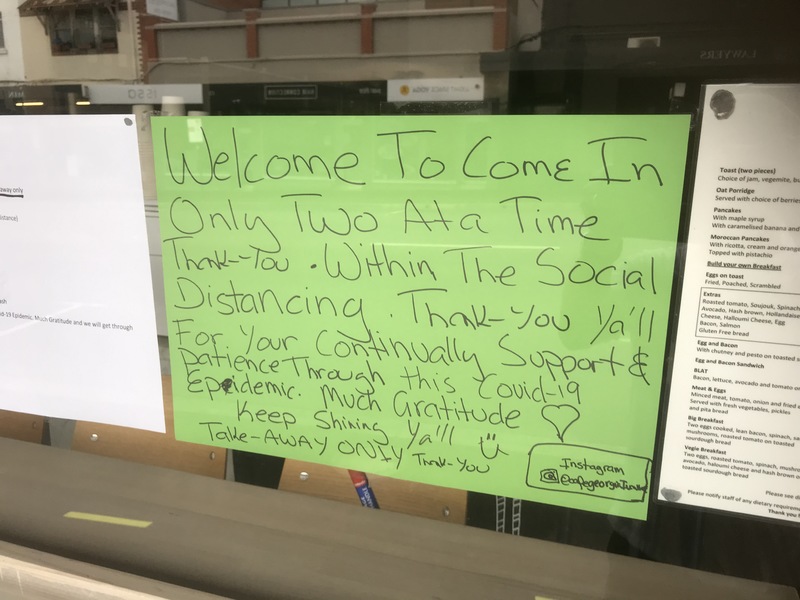
2020-04-01
Cafes and restaurants like Cafe Georgia in Ivanhoe now take-away only
-
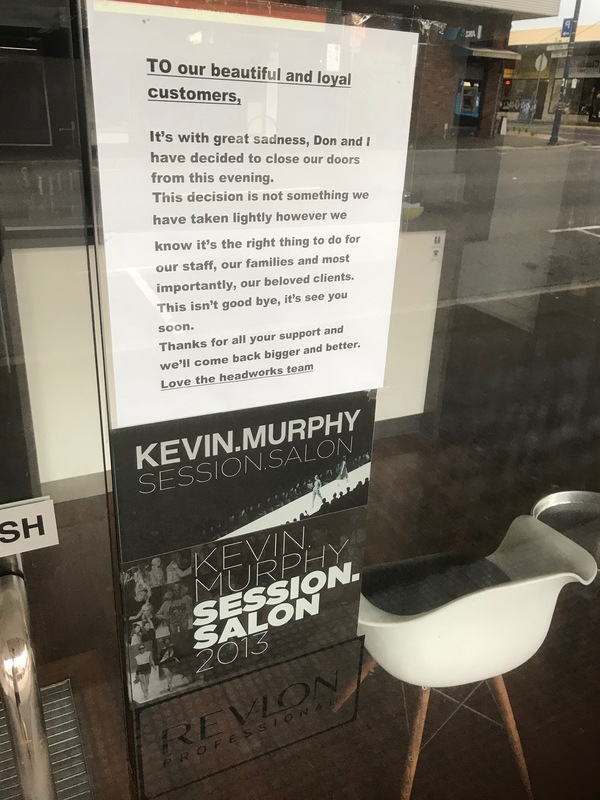
1 April 2020
Many shops on Upper Heidelberg Road in Ivanhoe now closed for business. There was some controversy when government allowed hairdressing appointments of 30 minutes when other businesses were already being asked to reduce their services and social distancing was already de rigueur.
-
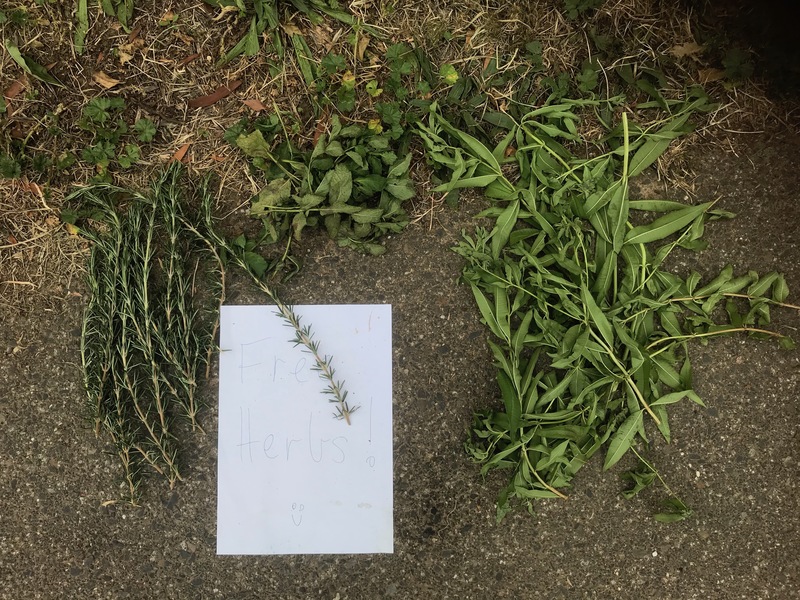
2020-04-01
The things you see out on a neighbourhood walk — kids finding ways to be helpful.
-
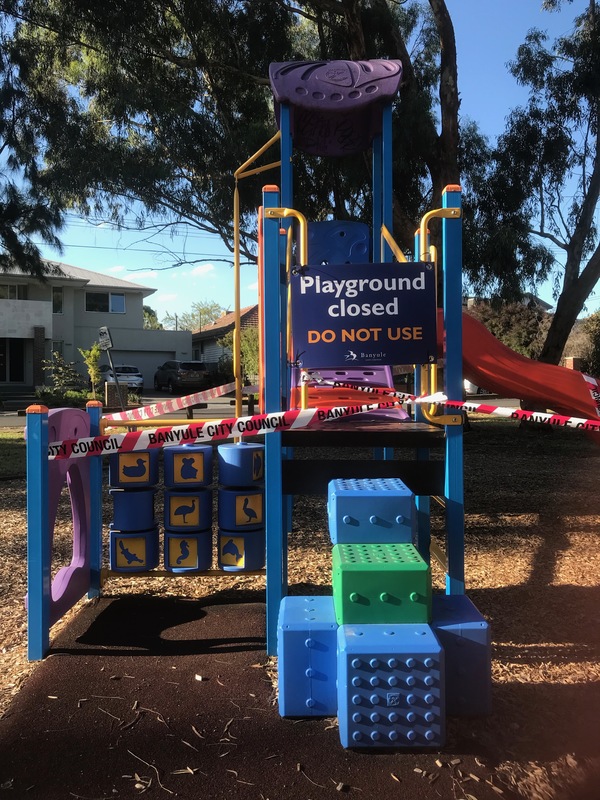
2020-03-31
All the local playgrounds closed from today. This one is Rossi Reserve in Ford Street, Ivanhoe.
 2020-04-17
2020-04-17 2020-04-17
2020-04-17 2020-04-17
2020-04-17 04/17/2020
04/17/2020 2020-04-17
2020-04-17 2020-04-09
2020-04-09 2020-04-08
2020-04-08 2020-04-21
2020-04-21 2020-04-21
2020-04-21 2020-04-21
2020-04-21 2020-04-21
2020-04-21 2020-04-21
2020-04-21 2020-04-21
2020-04-21 2020-04-21
2020-04-21 09/04/2020
09/04/2020 2020-04-14
2020-04-14 2020-04-08
2020-04-08 2020-04-09
2020-04-09 2020-04-12
2020-04-12 2020-02
2020-02 2020-02
2020-02 2020-02-11
2020-02-11 2020-03-23
2020-03-23 03/26/2020
03/26/2020 2020-03-29
2020-03-29 2020-03-20
2020-03-20 2020-03-25
2020-03-25 2020-04-08
2020-04-08 2020-04-08
2020-04-08 2020-04-03
2020-04-03 2020-04-02
2020-04-02 2020-04-03
2020-04-03 2020-04-07
2020-04-07 2020-04-01
2020-04-01 2020-04-06
2020-04-06 2020-03-22
2020-03-22 2020-04-06
2020-04-06 2020-04-06
2020-04-06 2020-04-06
2020-04-06 2020-03-23
2020-03-23 2020-03-31
2020-03-31 2020-04-06
2020-04-06 2020-03-27
2020-03-27 2020-04-06
2020-04-06 2020-04-02
2020-04-02 2020-04-03
2020-04-03 2020-04-01
2020-04-01 1 April 2020
1 April 2020 2020-04-01
2020-04-01 2020-03-31
2020-03-31